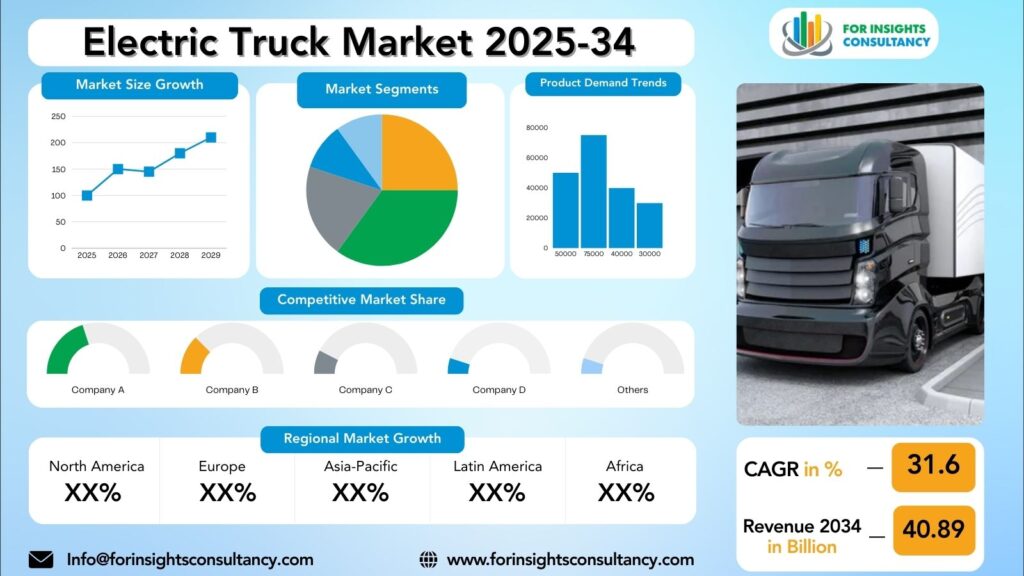
Electric Truck Market Research Report by Vehicle Type/Class (Light-Duty Truck, Medium-Duty Truck, Heavy-Duty Truck), By Propulsion/Powertrain (Battery Electric Vehicle (BEV), Plug-in Hybrid Electric Vehicle (PHEV), Fuel Cell Electric Vehicle (FCEV)), by Application (Last-Mile Delivery, Long-Haul Transportation, Logistics, Municipal Services, Construction & Mining), by End-Use Industry (Fleet Owners, E-commerce & Retail, Logistics Companies, Government & Municipalities), and Region Global Market Analysis and Forecast, 2025-2034
Aug-2025 Formats | PDF | Category: Automotive | Delivery: 24 to 72 Hours
Electric Truck Market is forecast to increase from USD 5.22 Billion in 2025 to USD 40.89 Billion by 2034, at a CAGR of 31.6%.
Electric Truck Market: A Comprehensive Overview and Future Developments
The electric truck market is experiencing significant growth due to concerns about emissions, rising fuel prices, and advancements in battery technology. Governments worldwide are implementing stricter regulations to reduce greenhouse gas emissions, leading to a rise in demand for electric trucks.
Future developments include infrastructure development, such as charging stations along major transportation routes, and technological innovations like autonomous driving systems and predictive maintenance solutions. As battery prices fall and economies of scale are achieved, electric truck costs are decreasing, leading to more companies transitioning to electric vehicles. As the cost of ownership becomes more competitive with traditional diesel trucks, the electric truck market is expected to continue growing.
The electric vehicle market has experienced significant growth in recent years, leading the way in sustainable transportation. The electric truck market is also gaining momentum as companies and governments focus on reducing carbon emissions and transitioning to cleaner energy sources, making electric trucks an attractive option for fleet operators and logistics companies.
Electric Truck Market Dynamics
Growth Drivers
The electric truck market is expanding due to stringent environmental regulations, cost savings, technological advancements, corporate sustainability initiatives, and consumer demand. Environmental regulations are pushing fleet operators to adopt cleaner, greener transportation solutions, while electric trucks offer a cost-effective option with lower maintenance requirements, reduced fuel costs, and longer operational lifespans. Technological advancements have improved the performance of electric trucks, enabling longer ranges, faster charging times, and superior power outputs.
Corporate sustainability initiatives are also driving the growth of the electric truck market. Companies are integrating electric vehicles into their fleets to demonstrate their commitment to sustainability and corporate social responsibility. This aligns operations with environmental goals and enhances their brand image.
Consumer demand is also driving the growth of the electric truck market. As awareness of climate change and air pollution increases, more consumers demand eco-friendly products and services, influencing businesses to adopt sustainable practices, including the use of electric trucks for product delivery and transportation.
Restraints
The electric truck market faces several challenges, including high initial costs, limited driving range, inadequate charging infrastructure, and maintenance and service requirements. The high initial cost of electric trucks compared to traditional diesel-powered ones is due to advanced battery technology and electric drivetrains, which increase manufacturing costs and pass them on to consumers. To address this, manufacturers and policymakers must collaborate to develop incentives and subsidies that lower the upfront cost of electric trucks. Advancements in battery technology and mass production can also help reduce manufacturing costs, making electric trucks more affordable for consumers.
Limited driving range is another challenge in the electric truck market. Electric trucks rely on battery power, so they need to be recharged regularly to maintain operation. Manufacturers are continuously working on improving battery technology to increase the driving range of electric trucks. Additionally, developing fast-charging infrastructure along major transportation routes can alleviate range anxiety and encourage widespread adoption of electric trucks.
The lack of adequate charging infrastructure is another significant restraint in the electric truck market. While electric vehicle charging stations are becoming more prevalent, they are not as widespread as traditional gas stations. Policymakers and industry stakeholders must work together to invest in expanding the electric vehicle charging infrastructure, increasing the number of charging stations along major transportation routes and in urban areas.
Maintenance and service requirements for electric trucks are another challenge. While electric trucks have fewer moving parts compared to traditional diesel trucks, they still require specialized training and equipment for maintenance and repairs. Manufacturers can provide training programs and support services to help fleet operators adapt to electric truck maintenance requirements, while standardized maintenance protocols and increased availability of spare parts can streamline the service process and reduce downtime for electric trucks.
Opportunities
The electric truck market offers numerous environmental benefits, including zero tailpipe emissions, cost savings, and government incentives. Electric trucks produce zero emissions, reducing air pollution and combating climate change. As governments implement stricter emissions regulations, demand for electric trucks is expected to rise.
Cost savings are another advantage, with lower maintenance and operating costs compared to traditional diesel trucks. Governments are offering incentives like tax credits, grants, or rebates to make electric trucks more affordable for businesses and individuals. The electric truck market is poised for growth as more companies take advantage of these incentives.
The expansion of charging infrastructure is another key opportunity for the electric truck market. Charging stations are becoming more widespread, making it easier for fleet operators to transition to electric vehicles. This expansion addresses range anxiety concerns and makes electric trucks more viable for long-haul transportation.
Innovative technologies in battery technology, vehicle efficiency, and autonomous driving capabilities are driving the electric truck market. Manufacturers are developing advanced electric trucks with longer range, faster charging times, and intelligent features that improve safety and efficiency.
Public perception of electric vehicles is shifting as consumers become more conscious of their carbon footprint and choose eco-friendly transportation options. The electric truck market provides companies with an opportunity to align with consumer values and demonstrate their commitment to sustainability.
Challenges
The electric truck market has experienced significant growth in recent years, driven by the growing demand for sustainable transportation solutions. However, the industry faces several challenges, including range anxiety, infrastructure development, cost considerations, and regulatory challenges.
Range anxiety is a major challenge, as electric trucks have a limited range due to battery capacity, which can be a concern for companies that need to cover long distances on a single charge. Manufacturers are working on improving battery technology to extend the range of electric trucks.
Infrastructure development is another challenge, as the current infrastructure is inadequate to meet the growing demand for electric vehicles. Collaboration between truck manufacturers, government agencies, and private companies is needed to invest in charging infrastructure to support the growth of electric trucks.
Cost considerations are another challenge, as electric trucks offer long-term cost savings in fuel and maintenance but can be a barrier for some companies. Balancing affordability and sustainability is crucial to encourage more companies to invest in electric trucks.
Regulatory challenges, such as varying regulations and incentives across different countries and regions, can also pose a significant hurdle for the electric truck market. Harmonizing regulations and providing clear incentives can help drive the market forward and encourage more companies to adopt electric trucks.
Electric Truck Market Top Companies Covered In This Report:
Evaluate The Strategic Positioning And Innovation Pipelines Of Leading Market Companies-From Multinational Enterprises To Disruptive Regional Firms. Understand How Key Players Are Innovating, Expanding, And Capturing Value, And Use Competitive Benchmarks To Plan Your Next Move.
- PACCAR Inc. (US)
- Foton Motor (China)
- Mercedes-Benz Group (Germany)
- Tesla Inc. (US)
- Scania AB (Sweden)
- BYD (China)
- AB Volvo (Sweden)
- Ford Motor Company (US)
- Rivian (US)
- Dongfeng Motor Corporation (China)
- VDL Groep (Netherlands)
- Workhorse Group (US)
- Bollinger Motors (US)
- MAN SE (Germany)
- Ashok Leyland (India)
Electric Truck Market News
Ford
In mid-2025, Ford announced it was again delaying its next-generation electric truck and van until 2028. The company cited a shift in focus to a new, more affordable EV platform for smaller vehicles, a move aimed at addressing a changing market.
Tesla
The 2025 Tesla Cybertruck was a major focus, with new versions being introduced, including a single-motor Long Range model. The Cybertruck’s performance, towing capacity, and unique design were highlighted in reviews.
Rivian
Rivian announced plans to expand its product line beyond its two current models, with the R2 and R3 SUVs on the horizon. The company’s CEO, RJ Scaringe, was named an “Auto Disruptor Executive of the Year” in 2024 by Newsweek, recognizing the company’s long-term strategic vision.
BYD
In July 2025, BYD rolled off its first vehicle from its new factory in Brazil, marking a historic milestone for the automotive industry in Latin America. While the initial focus was on passenger vehicles, this new production capacity underscores BYD’s global ambitions and its vertically integrated model, which is a key competitive advantage.
Segmented View of the Industry:
The Electric Truck Market Is Mapped Through A Multidimensional Lens-Tracking Shifts Across Product Type, Applications, And Geographic Regions. This Segmented Approach Enables Businesses To Localize Their Growth Plans And Align Offerings With The Most Profitable Demand Centers.
Segmentation by Vehicle Type/Class
- Light-Duty Truck
- Medium-Duty Truck
- Heavy-Duty Truck
Segmentation by Propulsion/Powertrain
- Battery Electric Vehicle (BEV)
- Plug-in Hybrid Electric Vehicle (PHEV)
- Fuel Cell Electric Vehicle (FCEV)
Segmentation by Application
- Last-Mile Delivery
- Long-Haul Transportation
- Logistics
- Municipal Services
- Construction & Mining
Segmentation by End-Use Industry
- Fleet Owners
- E-commerce & Retail
- Logistics Companies
- Government & Municipalities
Global Geographic Coverage:
The Report Provides In-Depth Qualitative and Quantitative Data On the Electric Truck Market For All Of The Regions And Countries Listed Below:
North America
North America is a major player in the electric truck market, with the United States and Canada leading the way in adoption and innovation. Companies like Tesla, Rivian, and Nikola are leading the development of electric trucks, while Canada has seen a surge in demand due to government incentives and growing environmental awareness.
The US market is rapidly expanding, focusing on medium-duty and heavy-duty vehicles for urban delivery and long-haul applications. The government’s push for cleaner transportation and advancements in battery technology is fueling the growth of electric trucks. In Canada, the electric truck market is on the rise, with companies like Lion Electric and GreenPower leading the way in producing electric trucks for various applications, including school buses and refuse trucks. Government support and a commitment to sustainability are driving the adoption of electric trucks across the country.
Europe
Germany, France, Sweden, Spain, and the United Kingdom are leading the way in electric truck technology development. Germany, known for its focus on sustainability and reducing carbon emissions, is leading the way in producing environmentally friendly and cost-effective electric trucks. Companies like Daimler and MAN are leading the way in producing environmentally friendly and cost-effective electric trucks. France’s government is incentivizing the adoption of electric trucks, with companies like Renault and Volvo working on models catering to the French market’s needs.
Sweden, known for its commitment to sustainability, is investing heavily in developing environmentally friendly and efficient electric truck technology. Companies like Scania and Volvo Trucks are also investing in electric truck technology. Spain, while not as well-known for electric trucks, is catching up with companies like Iveco and Nissan. The United Kingdom, with its emphasis on reducing carbon emissions and transitioning to greener transportation options, is also a significant player in the electric truck market. Companies like Tesla and Ford are working on developing environmentally friendly and technologically advanced electric trucks.
Asia Pacific
The Asia Pacific region is expected to play a significant role in the global electric truck market, with several major countries embracing sustainable transportation solutions. China, one of the largest automotive markets globally, is actively promoting the adoption of electric vehicles through incentives and subsidies. With stringent emissions regulations and growing emphasis on sustainability, the demand for electric trucks in China is expected to surge. Japan, with its strong infrastructure for charging stations and growing environmental awareness, presents a promising market for electric truck manufacturers.
South Korea, another Asian Pacific country, is also showing growing interest in electric trucks due to its government’s focus on reducing carbon emissions and promoting sustainable transportation solutions. Leading automotive companies in the country are investing heavily in electric vehicle technology, further driving the growth of the electric truck market.
Middle East and Africa
The Middle East is witnessing a surge in the adoption of electric trucks due to the growing focus on sustainable transportation and reducing carbon emissions. Countries like the United Arab Emirates, Saudi Arabia, and Qatar are leading the way in this market. The UAE has been promoting electric vehicles through government initiatives and incentives, with companies like Tesla, Rivian, and Nikola Motors making significant inroads. Saudi Arabia, known for its oil-rich economy, is also making strides in the electric truck market, with companies like Daimler and Volvo introducing their electric truck models. Qatar, another key player in the market, is committed to sustainability and environmental conservation, with companies like BYD and DAF establishing a strong presence.
Africa, with its vast potential for growth in the electric vehicle sector, is also experiencing a surge in the electric truck market. South Africa, known for its mining and logistics industries, is embracing electric trucks as a cleaner and more sustainable alternative to traditional diesel vehicles. Companies like Mercedes-Benz and Scania are actively introducing their electric truck models in the South African market. Kenya’s commitment to sustainable development and green transportation solutions is driving the electric truck market, with companies like Ashok Leyland and Mahindra Electric introducing their electric truck models. Nigeria, with its booming economy and growing urbanization, is also witnessing a shift towards electric trucks, with companies like E-tranzact and Innoson Motors making significant strides in the Nigerian electric truck market.
Reasons to Buy:
- The Research Would Help Top Administration/Policymakers/Professionals/Product Advancements/Sales Managers And Stakeholders In This Market In The Following Ways.
- The Report Provides Electric Truck Market Revenues At The Worldwide, Regional, And Country Levels With A Complete Analysis To 2034 Permitting Companies To Analyze Their Market Share And Analyze Projections, And Find New Markets To Aim For.
- To Understand The Most Affecting Driving And Restraining Forces In The Market And Their Impact On The Global Market.
- Major Changes And Assessment In Market Dynamics And Developments.
- The Objective Of The Electric Truck Market Report Is To Identify New Business Opportunities Using Quantitative Market Forecasts.
- Formulate Sales And Marketing Strategies By Gaining An Understanding Of Competitors, Their Positioning, And Strengths & Weaknesses.
Faq – What Global Leaders Are Asking
What Is The Growth Prospect For The Electric Truck Market By 2034?
Electric Truck Market Is Expected To Achieve A Stable Growth Rate With A Compound Annual Growth Rate (Cagr) Of About 31.6% From 2025 Through 2034.
What Is Driving The Growth Of The Electric Truck Market?
The growth of the electric truck market is driven by stringent government emissions regulations and corporate sustainability goals aimed at reducing carbon footprints. This is further fueled by advancements in battery technology that are increasing vehicle range and a developing charging infrastructure that supports large-scale fleet adoption.
Who Are The Key Players In The Electric Truck Market, And What Are Their Market Shares?
The Electric Truck Market Includes Major Companies Like PACCAR Inc. (US), Foton Motor (China), Mercedes-Benz Group (Germany), Tesla Inc. (US), Scania AB (Sweden), BYD (China), AB Volvo (Sweden), Ford Motor Company (US), Rivian (US), Dongfeng Motor Corporation (China), VDL Groep (Netherlands), Workhorse Group (US), Bollinger Motors (US), MAN SE (Germany), Ashok Leyland (India).
Specific Market Share Data Is Not Publicly Available and Is Typically Provided In Detailed, Proprietary Market Research Reports.
Which Regions Are Leading the Electric Truck Market Growth?
The Asia-Pacific region is the clear leader in the global electric truck market, driven by robust government mandates, aggressive electrification goals in countries like China, and the presence of major manufacturers. Meanwhile, North America and Europe are experiencing strong growth propelled by stringent emissions regulations, rising corporate sustainability targets, and significant investments in charging infrastructure.
Customization: We Can Provide Following Things
1) On Market More Company Profiles (Competitors)
2) Data About Particular Country Or Region
3) We Will Incorporate The Same With No Additional Cost (Post Conducting Feasibility).
Any Requirement Contact Us: Https://Www.Forinsightsconsultancy.Com/Contact-Us/
Table of Contents
For TOC Contact us: https://forinsightsconsultancy.com/contact-us/






